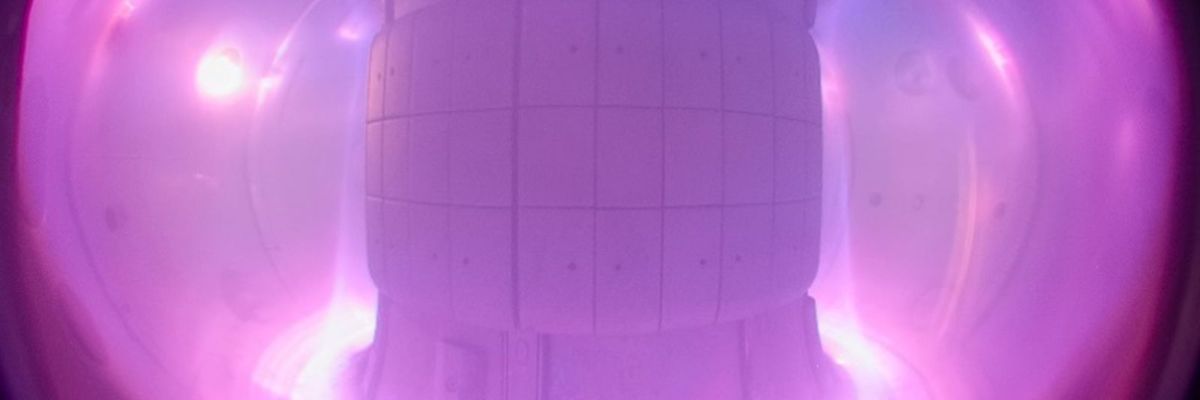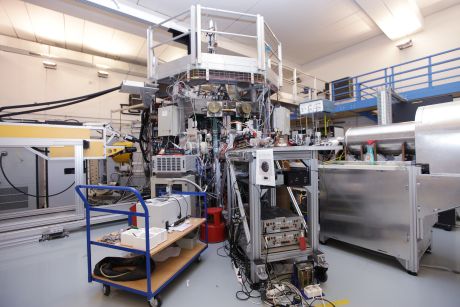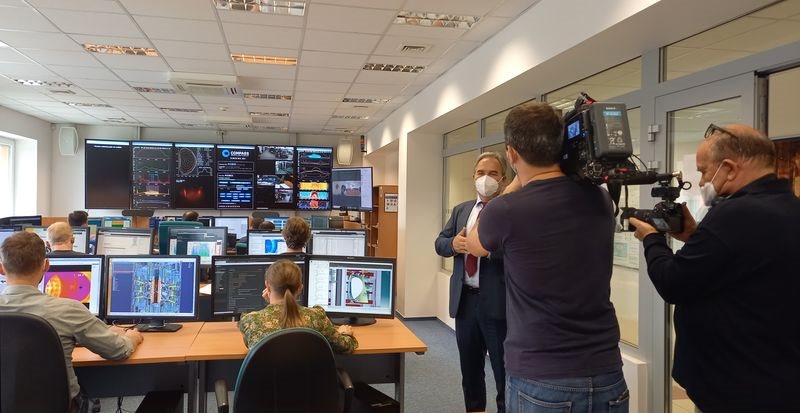
The COMPASS tokamak ends: A new era of fusion research begins in Czechia
27. 08. 2021
After 12 years of operation, the COMPASS tokamak conducted the very last experiment on Friday, August 20. The Czech tokamak significantly helped in designing a much bigger project – the international tokamak ITER that will be the first fusion device to produce net energy. COMPASS now steps back to allow the new tokamak COMPASS Upgrade with world-unique parameters to “shine”.
Nuclear fusion is a promising path to a low-emission and almost unlimited source of energy. Unlike nuclear power reactors, the fusion ones are super safe with barely any nuclear waste, and the “fuel” is everywhere. That is why nuclear fusion is in the centre of energy research in Europe.
A tokamak is an experimental machine designed to harness the energy of fusion. Inside the strong magnetic field, there is hot plasma at a temperature of millions Celsius degrees. It is similar to a little Sun.
Nowadays, some of the tokamaks are used for experiments to support the construction and operation of the ITER tokamak - one of the most ambitious energy projects in the world. The Czech tokamak (COMPASS), operated by the scientists in the Institute of Plasma Physics of the Czech Academy of Sciences (the CAS), was one of those. In the 12 years of operation, more than 21,000 high-temperature plasma discharges have been conducted on it. The scientific results highly exceeded expectations and brought the Czech scientists among the European top teams.
The Czech “Sun”
The experiments on the COMPASS tokamak had a significant impact on the design of the ITER tokamak. For example: an important research topic was the study of so-called error magnetic fields, which are created as a result of inaccuracies in the installation of huge superconducting tokamak coils.

“Tokamak COMPASS was the only one in the world equipped with a large set of additional coils that allowed these error fields to be mimicked,” explains Radomír Pánek, the Director of the Institute of Plasma Physics of the CAS. “The obtained experimental results allowed not only to determine the minimum accuracy of the installation of the magnetic coils of the ITER tokamak, but also to successfully develop procedures to additionally compensate for these error fields," highlights Radomír Pánek.
Research in nuclear fusion has been going on in the Czech Republic since the 1970s. In 2005, the installation of the COMPASS tokamak began and was successfully commissioned in 2009.
In the context of the Czech Republic, the COMPASS tokamak has been for a long time the largest scientific infrastructure, significantly contributing not only to the development of a clean energy source represented by thermonuclear reactors, but also serving as a platform for educating a new generation of scientists.

The last experiment on the COMPASS tokamak, 20 August 2021
The new era has already begun
In the COMPASS tokamak’s place, a completely new one will be built in the next years - the COMPASS Upgrade with world-unique parameters aimed at solving several key challenges associated with building a prototype fusion power plant. An intensive work is already underway.
It will occupy the same experimental hall and it will be the only one in the world capable of confining the plasma using extremely high magnetic fields (up to 5 Teslas), similar to the future largest tokamaks ITER and DEMO. The COMPASS Upgrade will be able to generate conditions similar in some aspects to those in these future facilities.
The nuclear fusion future
Worldwide research in this sector looks at 2025, when the international ITER tokamak will be commissioned in southern France. The next step will be to build a prototype DEMO fusion plant.
Text: Eliška Zvolánková, Division of External Relations, CAS Centre of Administration and Operations
Photos: Institute of Plasma Physics of the CAS; Stanislava Kyselová, Division of External Relations, CAS Centre of Administration and Operations
Read also
- A trapped state: The pandemic impact on public attitudes, trust, and behavior
- Aerial archaeology: Tracing the footsteps of our ancestors from the sky
- Archaeologists uncover ancient finds along Prague Ring Road
- Our microbiome largely depends on what we eat, says microbiologist Michal Kraus
- The ABCs of writing: Why did its invention mark a turning point for humankind?
- We learn, remember, forget… What can memory actually do? And can we outsmart it?
- New Center for Electron Microscopy in Brno opens its doors to global science
- The hidden lives of waste: What can we learn from waste workers and pickers?
- A unique lab is hidden right beneath Prague’s Vítkov Hill
- Renewables are a strategic investment in European security, scientists say
The Czech Academy of Sciences (the CAS)
The mission of the CAS
The primary mission of the CAS is to conduct research in a broad spectrum of natural, technical and social sciences as well as humanities. This research aims to advance progress of scientific knowledge at the international level, considering, however, the specific needs of the Czech society and the national culture.
President of the CAS
Prof. Eva Zažímalová has started her second term of office in May 2021. She is a respected scientist, and a Professor of Plant Anatomy and Physiology.
She is also a part of GCSA of the EU.